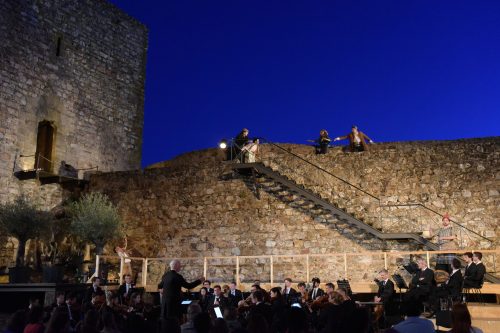 Portugal Marvão International Music Festival [2] – Mozart, Die Entführung aus dem Serail: Soloists, Cologne Chamber Orchestra / Christoph Poppen (conductor). Castelo de Marvão, Portugal, 21.7.2024. (LV)
Portugal Marvão International Music Festival [2] – Mozart, Die Entführung aus dem Serail: Soloists, Cologne Chamber Orchestra / Christoph Poppen (conductor). Castelo de Marvão, Portugal, 21.7.2024. (LV)

Production:
Director, Sets, Costumes – Sabine Theunissen
Lighting – Anatol Washke
Cast:
Belmonte – Martin Mitterrutzner
Pedrillo – Patrick Grahl
Konstanze – Leonor Amaral
Blonde – Heekyung Park
Osmin – Yannick Spanier
Bassa Selim – João Grosso (spoken role)
Dancer – Cláudia de Serpa Soares
To celebrate its tenth anniversary, the Marvão International Music Festival mounted Mozart’s happiest opera in a production that amplified its message of forgiveness into a delightful cautionary tale for our time. Director Sabine Theunissen turned her concern – ‘Do we have to choose one side in order to exist?’ – into a creative concept in which the character of Bassa Selim gained new importance. Acted by João Grosso with brooding intensity, Bassa Selim roamed the parapets, stairs and courtyard throughout the opera, narrating and commenting on the story and tracing the tracks of his own unrequited love for Konstanze. This gave him a continuity and persona that made his deus ex machina function more interesting and sympathetic. The result was far more compelling than the simple Singspiel role Mozart intended.
At one point, conductor (and the Festival’s co-artistic director) Christoph Poppen joined in the fun, pretending to grow tired of Bassa Selim’s long monologues (in Portuguese with subtitles in English on a video screen) and urging Grosso to ‘hurry up’. It was a clever and effective way of bypassing the opera’s original spoken dialogue and connecting more directly with the audience. Theunissen further enriched the action with dancer Cláudia de Serpa Soares, who represented Bassa Selim’s favorite wife or perhaps his entire harem, shadowing Konstanze throughout the opera, at one point slithering up and down the staircase from parapet to courtyard. At the end, when Grosso forgave his enemy’s son, Belmonte, and his friends, Serpa Soares reappeared at his side.
With its theatrical flair, the youthful joie de vivre of the singers, the calm hand of Poppen and the superb Mozartian style of the Cologne Chamber Orchestra, it was not just a well-meaning, enterprising performance but a genuine Mozartian miracle. And when one of the characters said, ‘I’m sure Mozart would rewrite it today’, it was a nod to the fact that Mozart worked very closely with his librettist – just fast forward 242 years and you get the Marvão Festival version. My only complaint was that the scene where Pedrillo plies Osmin with wine was too brief – but perhaps getting drunk these days is no longer so amusing.

The night before it had been photographers who had swarmed the ramparts. This time, with swallows swooping and darting around the castle and the occasional eagle gliding high in the skies looking for prey (and perhaps for music critics), it was the singers, actors and dancer who used the entire castle as their stage, including the courtyard in which the audience sat and the orchestra played. Martin Mitterrutzner’s ardent Belmonte (nice to have a tenor who looks and sings like a hero) walked through the orchestra and sat in with the second violins at one point. Yannick Spanier’s bass-light but earnestly comic Osmin tended plants like the captain in Mister Roberts. When Belmonte anachronistically motioned to his wristwatch at one point to hurry along his co-conspirators in their escape attempt, it was a perfect comic (if perhaps unintended) touch.
The spirited young cast was led by Leonor Amaral’s wonderful Konstanze. She used her warm, agile voice to summon all the opera’s emotions of love lost and found and dazzled with her coloratura in ‘Marten aller Arten’. Heekyung Park’s pert and pretty Blonde had the kind of stage presence that kept Osmin on his toes while delivering a brilliantly sung ‘Welche Wonne, welche Lust’. Patrick Grahl’s Pedrillo sang ‘In Mohrenland gefangen war’ with heartbreaking beauty, melting hearts in the courtyard.
Even the costuming was curiously endearing. Osmin and Pedrillo wore similar blue and white plaid shirts, presumably to represent their employment, while Bassa Selim wore a blue and red tartan. And Osmin, Blonde and a few others wore fuzzy bedroom slippers, presumably as a less stereotypical alternative to traditional ‘Turkish’ slippers with their turned-up toes.
At the podium, Poppen paid attention to details without becoming fussy, never impeding the action nor circumscribing the fun. Mozart’s characteristic use of divided violins enlivened the orchestral dialogue, and the solo playing from the flute, oboe, violin and cello in ‘Marten aller Arten’ was exceptional. The result was a well-balanced, engaging performance that respected Mozart’s work while entertaining the spectators. And the purely musical experience had surprising audiophile impact even in the outdoor space.
For 2025, the Festival will shift its focus. Opera will be set aside, the Cologne band will remain at home and the programming will consist entirely of chamber music. But the splendid isolation and beauty of the Marvão landscape will continue to offer the opportunity for musicians and audiences alike to leave worldly cares behind. As a young Portuguese violist said to me, Marvão is simply ‘the best summer festival there is’.
Laurence Vittes
